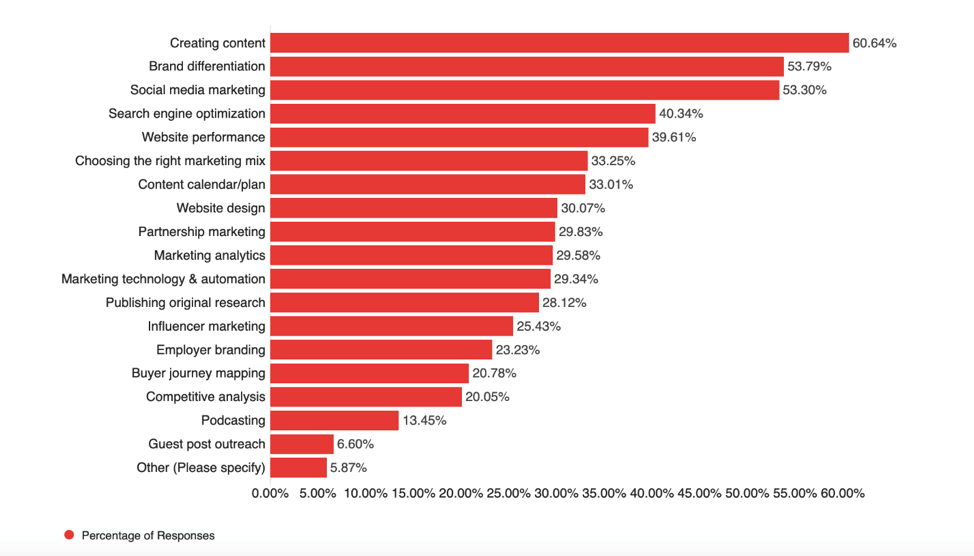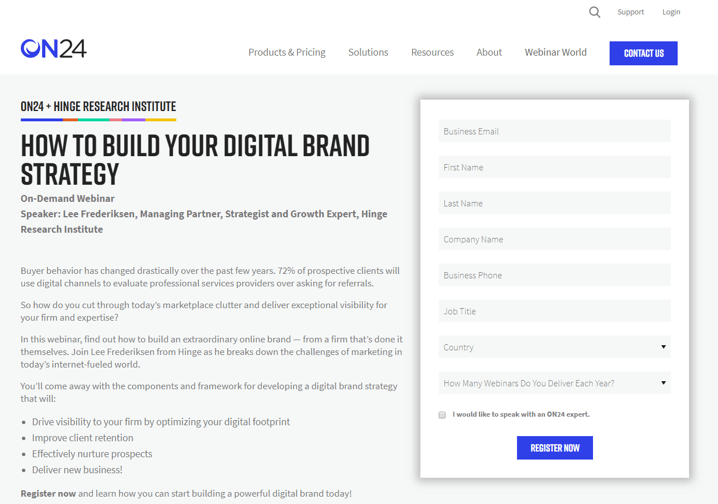What is Co-branding?
Co-branding is a marketing strategy where two or more brand names form a branding collaboration around a product, service, or topic. By blending the market strength and brand awareness of two or more companies, co-branding often improves customer bases, customer loyalty, brand image, and perceived value for all participants.

Shooting for the Stars
The word is out. Content is essential. Everyone is making content. In fact, Hosting Tribunal.com reports that there are over 500 million blogs across 1.7 billion websites. More than two million blog posts are published each day. According to LinkedIn, over two million posts, articles, and videos are shared on that platform daily. I’ve also heard that more than 500 million tweets are sent every day.
Yet, content creation is still a top priority for most B2B marketers. In fact, in the Hinge Research Institute’s 2020 High Growth Study of Professional Services Firms, content creation is the top priority.

Most companies, firms, associations, and other organizations are having to spend more money and time creating content to get lower results. Most can’t crack the code so just invest more time creating more content and hope their branding, social media, visible expertise, and pipeline goals are met.
So, how is your content performing? Does it stand out from the crowd? Are enough people reading it to make it worth your effort? Are you seeing any sales interest from it? Are more people following you as a trusted expert? Even if your content is great and interesting, I encourage you to take it further. Readers are swamped and even the best content can be missed. This is where co-branding, especially with research, can take your content to new levels of readership and engagement.

One of the most memorable examples I can think of is the “Stratos Project” with skydiver Felix Baumgartner. On October 14, 2012, from Roswell, New Mexico, Baumgartner ascended in a stratospheric, helium balloon 24 miles up in the air to the edge of space. He then jumped from the balloon platform back to Earth in a supersonic freefall.
The project was co-branded between Red Bull and GoPro. The project team was able to collect a lot of scientific information and Baumgartner became the first human to break the sound barrier without engine power. He parachuted safely to the ground.
Millions of people around the world watched this event. There were over three million tweets that discussed this event. Hundreds of articles were written. Red Bull and GoPro picked up thousands of social media followers. Talk about making content stand out.
But here is the really important part. While most would see this as a brilliant advertising or public relations campaign, Red Bull and GoPro saw it as a scientific mission that they were willing to sponsor. Public approval agreed with them. Most felt that the event was based on data and liked the fact that Red Bull and GoPro were willing to invest in improving society—and that drove a lot of the content. Most did not feel that it was a sales pitch. In the end, according to the research firm, IRI, Red Bull’s sales rose 7% to $1.6 billion dollar in the US.
Launching with Co-branding with Research
OK, hopefully you can see where co-branding makes sense. So, where does research fit it? For B2B marketers, research is a differentiator that can separate your content from the overwhelming good and bad content that we talked about earlier. Like the Stratos campaign, co-branding with research is based on data and does not come across as a sales pitch. In fact, it often influences or validates how buyers are thinking and helps to speed up the sales cycle.
Start Thinking of Research Differently
When most of us think about commissioning research, we think we need to learn about our competitors, help us gauge perception and awareness, and develop differentiators and messaging. These are all good ways to leverage research. But few of us think about using research in a variety of formats to support a content marketing strategy and enhance buyer engagement.
Five Ways to Make Your Content Stand Out with Co-branding and Research
Sponsor Original Research—Find an industry topic where the research can be revisited and refreshed on an annual or regular basis. This topic may be address salaries, industry priorities, emerging trends, etc. Once this core research is published, you can repurpose the insights in blogs, articles, social media posts, and more. By co-branding with a respected research firm, your thought leadership will be enhanced and you can penetrate aspects of an industry that you may have not been recognized for before. For example, you may be an accounting firm that wants to build up its advisory services so you come up with research around emerging trends in advisory services. You will be surprised at how buyers will look at your firm differently.
Leverage Research Analysts in Webinars—Another way to co-brand with research is to sponsor a webinar and have a research analyst be the primary presenter or at least be on a panel of presenters. Again, a tone is set where it is not a sales conversation, but an educational conversation. This webinar is a great way to extend the reach of the research you commissioned in suggestion #1. Most folks want to learn and are willing to give up an hour of time if they can walk away with one or two actionable insights.

Sponsor a Local Live Event—This is a great way to co-brand with research. While emails and webinars are effective, you will reach an audience with live events that you won’t with other channels. If your messaging is compelling and you have good speakers, some folks would prefer to come out and meet face-to-face, ask questions, go deeper. If you co-brand this event with an establish research firm, you should be able to leverage that firm’s database and marketing staff to help promote the event and secure registrations. Again, the research angle will appeal to a target audience who will not respond to traditional marketing messaging. Leverage the research firm’s brand and reputation as much as you can to help you increase your database—and your success.
License Existing Research—You want to take advantage of co-branding with research but perhaps you don’t have the time or budget for original research. Many research firms have programs now where you can license some of their key industry pieces of research for a year. With some of these programs, you can distribute the research through email, social media, trade shows/conferences, websites, content syndication, and more. It is a fast and effective way to ensure that your campaign stands out and your company or firm is associated with a given topic.
Sponsor an Existing Research Report—For many, the best way to step into co-branding with research is to sponsor an existing research report. This approach is less costly than original research and typical the report is produced on an annual or regular basis and has a base of followers or subscribers. With this type of sponsorship, a company or firm normally has its logo on the cover along with the logos of any other sponsors, and the logo of the research firm. Sometimes the sponsors can supply one or two questions for the survey/interview process which may provide specific insights for them. Again, since the report is produced annually or on some regular cadence, the report has a good shelf life and the content can be repurposed or repackaged many different ways. This certainly enhances branding and lead generation efforts.
Content may be king, but I would offer up that data and research are the royal guard that ensures that content remains king. I don’t see a lot of B2B marketers leveraging research right now to drive content visibility and engagement. That should make it a strong consideration as you plan how much effort you and your team will put into creating content this year. Make it stand out. Make it compelling. Make it worthwhile.